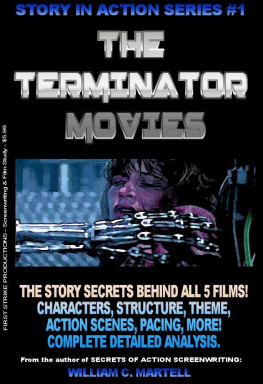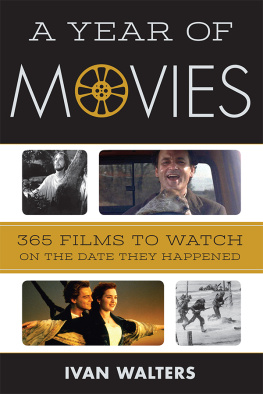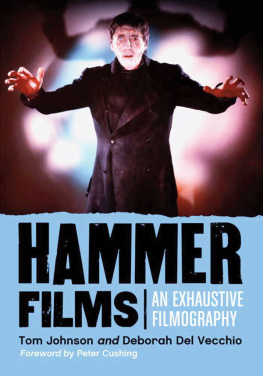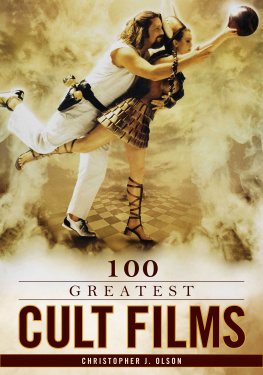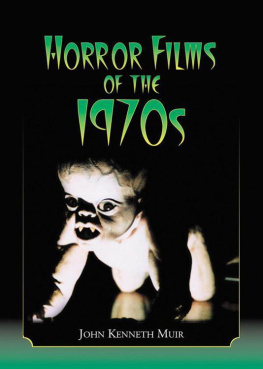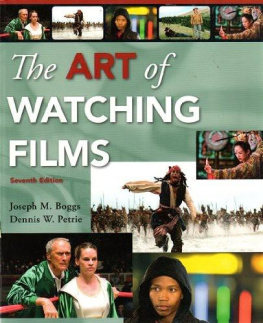100 Great War Movies
The Real History behind the Films
ROBERT NIEMI

Copyright 2018 by ABC-CLIO, LLC
All rights reserved. No part of this publication may be reproduced, stored in a retrieval system, or transmitted, in any form or by any means, electronic, mechanical, photocopying, recording, or otherwise, except for the inclusion of brief quotations in a review, without prior permission in writing from the publisher.
Library of Congress Cataloging-in-Publication Data
Names: Niemi, Robert, author.
Title: 100 great war movies : the real history behind the films / Robert Niemi.
Other titles: Hundred great war movies | One hundred great war movies
Description: Santa Barbara, California : ABC-CLIO, [2018] | Includes bibliographical references and index.
Identifiers: LCCN 2017053745 (print) | LCCN 2018005576 (ebook) | ISBN 9781440833861 (ebook) | ISBN 9781440833854 (hardcopy : alk. paper)
Subjects: LCSH: War filmsHistory and criticism.
Classification: LCC PN1995.9.W3 (ebook) | LCC PN1995.9.W3 N54 2018 (print) | DDC 791.43/658dc23
LC record available at https://lccn.loc.gov/2017053745
ISBN: 978-1-4408-3385-4 (print)
978-1-4408-3386-1 (ebook)
22 21 20 19 18 1 2 3 4 5
This book is also available as an eBook.
ABC-CLIO
An Imprint of ABC-CLIO, LLC
ABC-CLIO, LLC
130 Cremona Drive, P.O. Box 1911
Santa Barbara, California 93116-1911
www.abc-clio.com
This book is printed on acid-free paper 
Manufactured in the United States of America
This one is for Connie, who put up with an MIA husband, With far too many hours logged at his computer
Also dedicated to the memory of
Alfred A. Niemi, Sr. (19152005), 20th Air Force, Guam, Mariana Islands, World War II
Kenneth A. Niemi (19292014), 3rd Ranger Infantry Company (Airborne), Korean War
They Served Their Country with Honor
Contents
Introduction
The War Film
Even if this were not an American-made book by an American writer for a mostly American readership, the lions share of films covered herein would still emanate from the United States of America. Thats because the United States has been an extraordinarily bellicose nation since its inception, at war 222 of its 241 years to date (92 percent of the time). This being the case, American society has always had an outsized reverence for the force of arms and all things militaryregarded in the popular imagination as the only true and sacrosanct test of authentic masculinity, courage, and patriotism. Accordingly, Americans have an abiding passion for war films. Thats why we make so many of them and why American war films consistently rank among the worlds most accomplished and popular films, ethical and political considerations notwithstanding.
Though always a crowd-pleaser, the war film genre is an inherently schizoid one. In an earlier era, war films often functioned as jingoistic propaganda or de facto recruitment vehicles (there is a long history of the Department of Defense providing material support for war films for which it approves). In more recent decades increasingly jaded tastes and political complications have spawned war films that mostly traffic in the high-octane machismo of martial gloryputatively apolitical but ideologically suspect upon closer examination. On the other side of the schism are anti-war films, which attempt to characterize war more realisticallyas, at best, an unavoidable tragedy in service to a good cause (e.g., to end slavery or defeat fascism) or, at worst, a senseless orgy of death and destruction that only benefits corrupt ruling elites, war profiteers, and undertakers. And it gets more complicated still, because the divide between the tendency to romanticize or condemn war is often blurred within each war film, insofar as the cinematic depiction of combat typically comes off as thrilling entertainment that often amounts to a pornography of violence, a tendency famously identified by Francois Truffaut, who wrote: It seems to me that war films, even pacifist, even the best, willingly or not, glorify war. A film that truly shows war, battles, almost necessarily exalts warunless it is a matter of parody The effective war film is often the one where the action begins after the war, when there is nothing but ruins and desolation everywhere War should not be shown as an accepted fact, inevitable, imponderable, but rather as a human decision, made by a small group of men After having shown those who give the orders, one should show those who receive them, and their reactions (the simple soldiers) (quoted in French, 2006).
All too often, war films implicitly serve an oppressive social order by making the worst of human evils palatable to impressionable young men ardent for some desperate glory, as Wilfred Owen put it. They do so by making mortal combat a sanitized and fascinating aural-visual spectacle, viewed in the comfort and safety of the Cineplex auditorium or the family living room or on ones iPhone, far removed from the squalor, stench, terrifying dangers, and agonies of the real thing. At the same time, conventional war films often afford short shrift to the wider context in which combat occurs. Refusing to address why a war is being fought (and for whose benefit), many war films are really narrowly focused survivalist pictures that show soldiers fighting for one reason and one reason only: to stay alive and to ensure that their brothers-in-arms survivea morally unassailable rationale to be sure, but one that also involves a pernicious kind of political myopia that needs to be interrogated and called out. (Though well-made and often gripping, films like Black Hawk Down , We Were Soldiers, American Sniper , and Lone Survivor are guilty of ideological evasions and historical misrepresentations that subliminally glorify the business of war by glorifying the warrior, an equation that is by no means inevitable, or even logical.)
On the other side of the divide, the greatest war films are always anti -war films, especially the ones that emanate from actual combat veterans who have known the true face of war and wish to educate the uninitiated to its horrors, for example, Erich Maria Remarque ( All Quiet on the Western Front ), Humphrey Cobb ( Paths of Glory ), Pierre Schoendoerffer ( The 317th Platoon ), Kurt Vonnegut ( Slaughterhouse-Five ), Lothar-Gnther Buchheim ( Das Boot ), James Carabatsos ( Hamburger Hill ), and Oliver Stone ( Platoon ), among many others. Films based in the real experience of combat veterans are obviously better able to represent wars deadly mayhem without making it an exhilarating advertisement for more of the same in real lifethough no film is immune to grossly distorted viewer reception.
In sum, the war film genre is extremely variegated, rife with contradictions, and layered with ideological complexities that have been treated in depth in dozens of academic studies. The aim of this book is more modest: to present a wide sampling of the best of the genre and to provide sufficient background information about how the film came into existence and how it relates to the real history it purports to represent in either broad or very specific termsthe two things that most often stimulate viewer curiosity.
Selection Criteria
Though many selections for the greatest war films are obvious (e.g., Lawrence of Arabia , The Bridge on the River Kwai ), no two people could ever agree as to the top 100 entries in the war film genre. Tastes vary, as do underlying ideological biases and agendas. At any rate, the film list I compiled for this book derives from a lifetime as a film buff, 30 years teaching film at the college level, writing several film books, taking suggestions from friends and colleagues, and doing extensive research, including a thorough review of the best of lists compiled by other film critics and historians. Readers might find a few of the selections herein quirky and may strenuously object to certain omissions (e.g., Casablanca or Gone with the Wind , which are essentially wartime romances). All I can say is that I have tried my best to produce a book that is broadly representative of the genre in all its variety and complexity.
Next page

